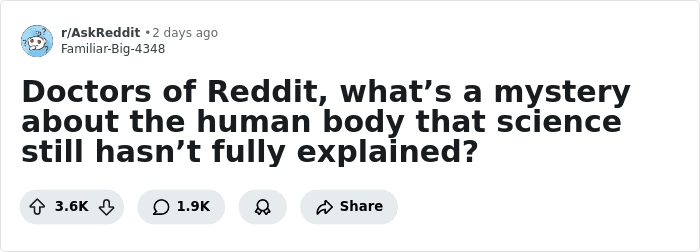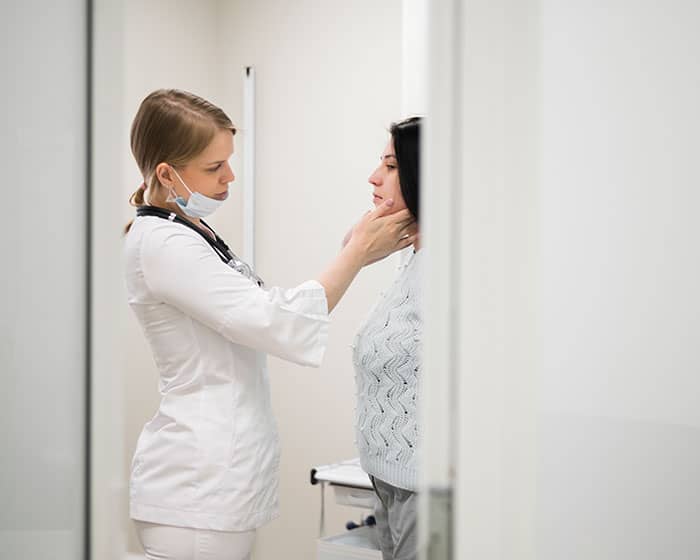It’s wild to think that we’ve grown organs in labs, built robots that can perform surgery, and started producing mind-controlled prosthetics, but we still don’t know exactly how anesthesia works, or what’s actually going on when a baby has colic.
For all the incredible progress made in modern science, it seems the human body continues to hold some stubborn secrets. Beneath our skin lies one of the most complex and mysterious systems in the universe, and experts are struggling to piece together how and why it all functions the way it does.
Someone recently asked doctors, “What’s a mystery about the human body that science still hasn’t fully explained?” and the answers came pouring in faster than you can say, “I really don’t know.” It wasn’t only medical experts giving their two cents, but also ordinary people who’ve been met with blank stares after asking a doctor about something seemingly simple.
We has put together a list of the best answers for you to scroll through while you wonder why you get goosebumps, talk in your sleep, or why yawning is contagious. May they serve as reminders that no matter how far we’ve come, we still have a long way to go.

#1

Whether or not women are sentient and experience pain. I mean, I feel like I know, but a lot of doctors don’t seem to.
Have you ever wondered why we have fingerprints? Well, so have some scientists…
Initially, it was thought that the swirly patterns helped us to grip things. But it turns out that might not be the case. “Fingerprints actually allowlessof our skin to come into contact with objects than perfectly smooth fingertips would,” reports thehealthy.com.
According to the site, some theories about the evolutionary purposes of fingerprints include that they protect our fingers or provide touch sensitivity. But at the end of the day, scientists really don’t know.
#2

I was in hospital once and about to be put under sedation – I casually asked how Anesthesia works to which the anesthetist replied “We don’t actually know”.
When I got home I did some research – we don’t know how anesthesia actually works, we just know that it does.
#3

How some people dont have an inner monologue.
Another “shower thought” you might have had is why some people are left-handed while others are right-handed, or why we even need to have one dominant hand.
Only about 10% of people are left-handed, and the vast majority are right-handed. Should we not have evolved enough by now for us to use both hands equally?
#4

🎶 We never really studied the female body. 🎶.
#5

The immune system is just its own insane thing. My son is recovering from Guillain-Barré syndrome and what I have learnt is that the immune system just does random stuff sometimes and we don’t know why and have to hope it calms down before it destroys something important. So unsettling honestly.
#6

How the brain deals with damage. We can’t give recovery times, or predict outcomes as we just don’t know. The brain is remarkably resilient and fragile all at the same time.
“Some of the theories think it’s because of the way our brains are wired,” says American evolutionary psychologist and behavioral geneticist, Dr. Nancy Segal, adding that “Handedness does seem to have a genetic component that is inherited but there’s no simple pathway from parent to child we’re able to figure out.”
Segal told CBS News that “lefties” often have a more dominant right side of their brain, while righties have a more dominant left side of their brain.
“Why is still a mystery,” reports the outlet.
#7

Autoimmune anything. I used to think it was pretty straightforward then I was diagnosed with a disorder. Everything is so hit and miss and open to interpretation, even bloodwork. I went from seropositive to seronegative at one point, how??? Do antibodies, rheumatoid factor, and ana just disappear? Or fluctuate? Depends on the rheumotologist you ask.
Symptoms all overlap for so many similar things and the treatments all work differently for different people until sometimes they randomly don’t or do for awhile then quit. Maybe you have Lupus maybe you have Arthritis? Can’t be sure so take this malaria medicine about it and let me know if you get mouth sores, your liver swells up, or it does nothing for no reason. Could be the meds, could be a flair.
Either way it’s going to affect parts of your body you never knew interacted. How is your relationship with gluten and dairy because it’s about to get weird. Which came first, the depression or the inflamation? No idea, but here’s another four pills about it. You’re hypermobile ever heard of Elors Danlos or pots? Similar but different but who knows… why did you come in again?
Fatigue 😩.
#8

How placebo meds have actually made a big difference in disease treatment.
#9

ALS.
It’s a horrible disease with no cure, no real treatment, no known cause, and 100% death rate. Diagnosis is often only through a lengthy process of elimination. Typical life expectancy after diagnosis is 2-5 years. It causes slow, progressive degeneration and loss of muscle function leading to paralysis. Probably something autoimmune related which is its own can of worms.
It has at least 3 common names for the same thing:
Amyotrophic Lateral Sclerosis (ALS)
Lou Gherig’s Disease
Motor Neuron Disease (MND).
Then there’s the issue of dreaming… Why do we do it? What’s the point?
“Humans spend nearly a third of their lives asleep, yet science has still very little understanding of how and why we dream,” reveals Health and Wellness expert, Caleb Backe.
According to thehealthy.com, dreaming occurs during REM sleep, and our heart rates increase when we dream. As with other mysteries, scientists are divided about what purpose dreaming actually serves.
#10

There is still no single concrete scientific model for what consciousness is.
We know that the brain is a network of neurons that send electrical signals to each other, something like a complex computer. We can observe the functioning of the hardware through functional magnetic resonance imaging (fMRI) scans. We can even identify which parts of the brain are active when we feel happiness, sadness, or recognize a face.
But we have no idea how this electrical and chemical activity results in the creation of the subjective, first-person perception of seeing the color red, feeling heat, or possessing a sense of self. This is what philosophers call the hard problem of consciousness.
We are becoming extremely good at imitating the functions of the brain with artificial intelligence, but we haven’t even begun to try to imitate the experience itself. It is the greatest mystery that exists.
#11

How acetaminophen works. For the record, I’m not in any way talking about autism here.
#12

I’m not a doctor, but I’d really like to know what dreams are and why we have them. What’s the point of them?! It’s completely fascinating and I’m nowhere near smart enough to understand most of the human body, but I’d still love to know why I have my own cinema hall in my brain but only when I’m asleep.
And also w*f that house I keep dreaming of is. I’ve never lived in it. None of my friends have ever lived in it. I do not recognize it at all.
“Apopular theorysuggests that dreaming is how your brain sorts through the memories of the day, deciding which ones are valuable and which are irrelevant,” reports the site.
“Other scientists, though, believe that dreaming actually serves no real function and that it’s just what our unconscious mind does when untethered by our awake selves,” it adds.
#13

The microbiota, dysfunctions in which likely explain at least a few functional disorders that we don’t understand e.g. IBS.
People with IBS have symptoms but otherwise will have completely normal gastrointestinal investigations, ie there is no structural problem that can be conventionally identified.
Increasingly it’s thought that IBS may be a disease of disordered microbiota which in itself isn’t well understood. The microbiota even more mysteriously seems to have some connection to the brain and mind itself which may be why IBS is often comorbid with psychiatric problems like anxiety and depression.
#14

Exactly why we need sleep and how it works. We have a general sense, but can’t explain it beyond the brain needs it.
#15

Not a doctor, but recently went through cancer treatment. One of the medications I was on is designed to stimulate white blood cell production, but a nasty side effect is that it can cause your bones to hurt.
Antihistamines work REALLY well to stop the pain, and no one knows why.
Apart from the general mysteries about the human body, there are many individual medical cases that still remain unsolved. Take the girl who never aged, for example…
As Reader’s Digest reports, Brooke Greenberg passed away in 2013, at the young age of 20. “But she didn’t look like your average 20-year-old because her body had stopped developing at the age of 5. Her hair and nails were the only parts of her body that continued to grow year by year,” reads the site.
#16

Migraines.
#17

Colic. The bane of my pediatric specialty.
Oh your kid screams uncontrollably for hours on end? Welp just don’t shake your baby. Good luck!
#18

When I was choosing major back in my college days, I had many discussions with professors that essentially reduced to:
– a doctor never truly understand how to fix a patient’s problem (or even why a medicine works), but
– an engineer can truly expect to resolve a machine’s root problem, because there is always a logic to how things work (or not work).
So I chose engineering and stayed in it for 40 years. No regret.
It’s a phenomenon that doctors just could not explain, no matter how hard they tried.
“Numerous DNA studies showed no abnormalities in her genes associated with aging, nor did her parents have a history of abnormal development. Plus, all her sisters were normal and healthy,” Reader’s Digest notes, adding that scientists refer to her condition as Syndrome X, a metabolic syndrome.
“Yet her unusual condition remains unexplained by science,” the site concludes.
#19

Most things related to pregancy. Also pathologies like eclampsia is not wekk understood. Babies are also pretty wild. .
#20

It gets really fun when you take two “we don’t really know” areas, like women’s health and ADHD, smash them together and take it to your doctor for questions. So much fun, that. .
#21

Endometriosis. It’s severely underresearched with no real known cause for why the body will do that. Severely painful to live with and affects more than just “bad periods”. Mine would trigger my sciatic nerve I believe and would cause major weakness in my legs to the point I began using a cane on a daily basis before I had a hysterectomy.
#22

HOW DO WE KNOW SOMEONE IS STARING AT US? No wires, no noises, just a psychic feeling. We even get the direction right most of the time.
#23

Not 100% sure what kickstarts labour. We know how it proceeds, but the trigger is not 100% confirmed/known. A popular theory is the excretions from the lungs of the infant signalling the placenta to get the ball rolling.
#24

Not a doctor, but I haven’t been able to get an answer for why we yawn or why it can be ‘contagious’.
#25

Why carbon decided one day it has stuff to do.
#26

Massage therapist here, and I have one. You know when you have those places that hurt when pressed into? If you press into them and hold pressure, they go away sometimes and sometimes they don’t. We don’t know why. We don’t even really know what those areas of pain (when you press on them) really are.
#27

No one knows what causes essential tremors.
#28

The mechanism of the photic sneeze reflex – why some people sneeze when they go out in bright light.
#29

Most of it isn’t fully explained. Most of it is partially explained. A lot of engineering-types of people come into the hospital expecting the body to be explained- if there’s a problem you simply need to find the bug and fix it let me see the data I can do it myself – and then they get wildly disappointed when symptoms and lab values and imaging don’t correlate one to one, that medications have side effects that sometimes are worse than the problem they are meant to solve, and that replacement of one organ doesn’t fix the rest of the organs that are failing, even if the damage was all related to the first organ. The idea that humans and their body parts have a life span is both innate understood and yet impossible for many people to comprehend. Anyway- there’s more that we don’t know than that we know about how it all works. That’s why science funding and high quality research are important to fund.
#30

Sleep.
#31

Fibromyalgia.
#32

Epilepsy/Seizures.
Most people don’t realize this, but in around 60–70% of epilepsy cases, doctors can’t find a clear cause. It’s not that the cause doesn’t exis.
it’s just that our current tests can’t detect it yet. Epilepsy can come from tons of different things (genetics, brain injury, infections), but for most patients, it ends up being labeled as “unknown cause” or “idiopathic. Or in my case STRESS. W*f
Science still has a lot to figure out about what’s going on under the surface.
#33

Last time I checked, the question of why we cry tears hasn’t been fully answered.
Also, the effect of lithium as a mood stabilizer.
#34

Why identical twins, where the embryo splits at the beginning of pregnancy, occurs.
#35
How we lose accommodation ( our ability to read small print). We have a lot of theories but no concrete explanation as to why. The lens continues to grow throughout our life but it becomes more biconvex which should add plus power to the eye but it doesn’t. The ciliary muscle remains functional well into the 90th decade. The lens zonules remain attached and functional throughout life. We think it’s a change of all the above. But, no smoking gun. This is why you can ask 10 different eye doctors why we lose our ability to read small print and each have a different reason why.
#36
Your scientists have yet to discover how neural networks create self-consciousness, let alone how the human brain processes two-dimensional retinal images into the three-dimensional phenomenon known as perception.
#37

Frozen shoulder! We know who it tends to affect (mainly middle aged people, diabetics), but the why isn’tfully understood.
#38
Just the brain full stop. Our understanding of how brain leads to “us”, is laughably weak.
#39
The human body is so incredibly complicated that it’s a miracle it’s able to function at all.
#40
I’m an anesthesiologist. And … we don’t really know how a lot of anesthetic agents actually work.
#41
Genetics. How was I born with my grandmother’s chestnut hair color, my Dad’s green eyes and small hands, and my mother’s hips and beautiful fingernails? There are six of us. We all look different with pieces of other relatives showing up in facial features, hair color etc.
#42
The question of what exactly causes birth to start is unknown.
#43
I don’t think we’ll ever fully understand the human mind.
#44

Why are men?